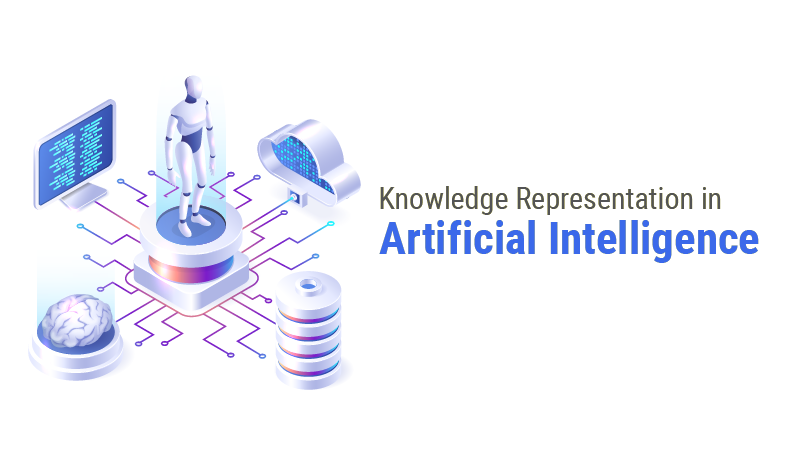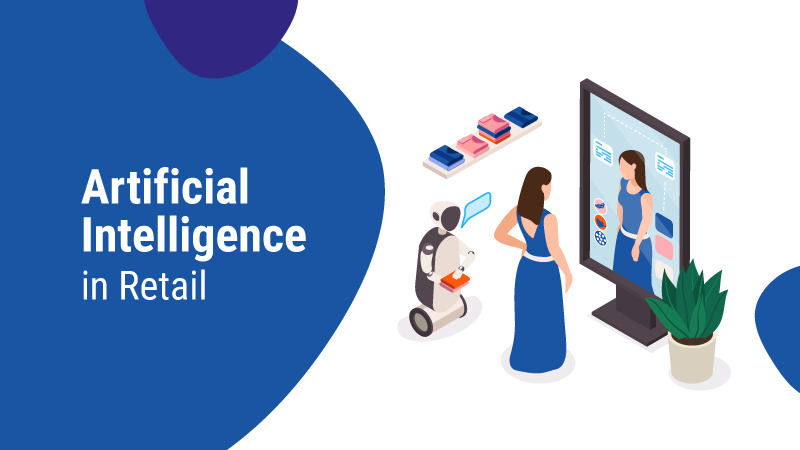Knowledge Representation in Artificial Intelligence

Artificial Intelligence (AI) has always been considered an innovative technology that took the human world to another level. It demonstrates the power of human intelligence when incorporated with machines. Several AI-powered devices and systems have taken control of the market because of their capability and efficiency in completing tasks using human intelligence. There are things that we don’t know much about AI.
Here in this article, we are going to talk about Knowledge Representation in Artificial Intelligence.
What is Knowledge Representation in Artificial Intelligence?
Knowledge representation can be explained as the way artificial intelligence represents knowledge not with the help of stored data in the system but with prior experiences and knowledge to act like an intelligent human.
Do you know what makes human beings different from machines? Intelligence? No, because that is what AI does – imitating human intelligence. One thing that differentiates human beings from machines is our conscience (the total of all the knowledge we have gathered so far) or the ability to think and reason. Humans use this particular ability to perform every single action in our life. For instance, we are aware that touching a hot pan can burn our hands even before we touch them. This is the human mind’s complex way of working and if we want to impart this complex knowledge into a machine, we need to give more advanced information to AI, which in turn resulted in the concept of Knowledge Representation in AI.
What knowledge needs to be represented?
Below are the different kinds of knowledge that need to be represented.
Object
There are many objects present in the human world. All information we have, related to all the objects, can be considered as a type of knowledge. For instance, a bus has wheels and a guitar has strings, etc.
Events
Our understanding of the world is based on the idea we have about the various incidents that have occurred in our world. Thus, events refer to every action that happens in our world.
Performance
The term is used to explain human behavior or the way they perform certain actions during different situations.
Meta-knowledge
Knowledge about things we are already aware of.
Facts
The reality of the actual world and what we stand for.
Knowledge base
Knowledge Base abbreviated as KB is the most significant part element of knowledge-based agents. It refers to a set of information about any discipline, field, etc. For example, a knowledge base on road construction.
Types of knowledge representation
There are different types of knowledge which are categorized as follows:
Declarative knowledge
It refers to the knowledge that lets us describe our world and it contains everything including ideas, facts, objects, etc… and therefore deals with the description of things.
Procedural knowledge
Also referred to as imperative knowledge. It refers to more complex concepts (how things work or behave) than declarative knowledge. Therefore, this knowledge is used to complete any task with specific rules, processes, and agendas and thus makes the system work efficiently. Also, this kind of knowledge relies on the task we are trying to finish.
Meta-knowledge
Meta-knowledge, as mentioned above, is a set of cognitive knowledge when combined. So, this is knowledge about different types of knowledge.
Heuristic knowledge
Heuristic knowledge is the knowledge imparted by experts of particular domains, topics, and areas, which they have acquired after years of experience. This kind of knowledge enables you to take a better approach to specific problems and make decisions.
Structural knowledge
This type of knowledge serves as the basic form of knowledge for solving problems in the real world and helps to establish a connection between ideas or objects and their description.
Properties of knowledge representation
There are certain properties or requirements for a good knowledge representation system. This system should demonstrate some of the features that help us to evaluate the system. These properties are listed below:
Representational adequacy
Adequacy and the ability to make the AI system understand are the important assets of a knowledge representation system, which means it represents all the knowledge necessary to manage a particular field or domain.
Inferential adequacy
It refers to the flexibility of the knowledge representation system to deal with the existing knowledge to pave the way for new knowledge.
Acquisitional efficiency
The ultimate property of the knowledge representation system is its ability to automatically acquire new knowledge, enabling AI to integrate into its existing knowledge and, as a result, become more efficient and productive.
Inferential efficiency
With the presence of existing old knowledge, the system of representation cannot include new knowledge but it can put in this knowledge efficiently and without hindrance.
The Connection between knowledge and intelligence
While AI Development companies builds these systems, knowledge of the actual world plays an important role in intelligence, as well as in the creation of artificial intelligence. When it comes to expressing intelligent behavior in AI agents, knowledge plays an essential part. An agent cannot function accurately, without enough knowledge or experience of certain inputs. For example, if you have to interact with a person and you are unable to understand his language, then definitely you will not be able to give a response or deliver any action. This is the same as with the intelligent behavior of the agents. A decision-maker works by discovering the environment and applying knowledge. However, without the knowledge component, it cannot exhibit intellectual behavior.
Wrap Up
Knowledge representation is an important factor in making the future AI system much better than it is today. While designing an AI knowledge representation system, there are some knowledge representation problems one has to be aware of. As mentioned before, the key is to impart wisdom to the systems, for which we require a knowledge representation system.
We have also gone through the types of knowledge we have, the relation between a knowledge representation system and Artificial Intelligence, and the properties of knowledge representation systems as well. Moving further, we are waiting for a more advanced and better knowledge representation system. We can impart knowledge to the AI system in the same way we impart knowledge to other human beings and without any hindrance.
Get Started with our AI Services0 thoughts on “Knowledge Representation in Artificial Intelligence”
Leave a Reply
Blogs by Category
AppForms Artificial Intelligence Blockchain Call Centers Chatbots Cloud Computing Data Management Design Digital Marketing Digital Transformation Enterprise Applications FinTech Insights LowCode Development Microsoft Mobile Apps News Office 365 Robotic Process Automation Security SharePoint Software Development Web ApplicationArtificial Intelligence in Retail

2024-05-23 14:12:28
Can u suggest a good book on this?
Included with each one good example of current computational task it wà more interest other it’s simple text book material of brachmann content